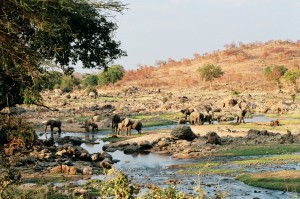The Great Ruaha River is a river in south-central Tanzania that flows through the Usangu wetlands and the Ruaha National Park east into the Rufiji River.

Great Ruaha River - Elephants
Great Ruaha is about 475 km (300 mi.) long, 38 species of fish have been identified in the Great Ruaha River. The river’s headwaters are in the Kipengere Mountains. From there the Great Ruaha River descends to the Usangu Plains, an important region for irrigated agriculture and livestock in Tanzania. The river eventually reaches the Mtera Dam and then flows south to the Kidatu Dam.
Second only to Katavi in its aura of untrammeled wilderness, but far more accessible, Ruaha National Park protects a vast tract of the rugged, semi-arid bush country that characterizes central Tanzania. Its lifeblood is the Great Ruaha River, which courses along the eastern boundary in a flooded torrent during the height of the rains, but dwindling thereafter to a scattering of precious pools surrounded by a blinding sweep of sand and rock.
A fine network of game-viewing roads follows the Great Ruaha and its seasonal tributaries, where, during the dry season, impala, waterbuck and other antelopes risk their life for a sip of life-sustaining water. And the risk is considerable: not only from the prides of 20-plus lion that lord over the savannah, but also from the cheetahs that stalk the open grassland and the leopards that lurk in tangled riverine thickets. This impressive array of large predators is boosted by both striped and spotted hyena, as well as several conspicuous packs of the highly endangered African wild dog.
Ruaha’s unusually high diversity of antelope is a function of its location, which is transitional to the acacia savannah of East Africa and the miombo woodland belt of Southern Africa. Grant’s gazelle and lesser kudu occur here at the very south of their range, alongside the miombo-associated sable and roan antelope, and one of East Africa’s largest populations of greater kudu, the park emblem, distinguished by the males’ magnificent corkscrew horns.
A similar duality is noted in the checklist of 450 birds: the likes of crested barbet, an attractive yellow-and-black bird whose persistent trilling is a characteristic sound of the southern bush, occur in Ruaha alongside central Tanzanian endemics such as the yellow-collared lovebird and ashy starling.
Service Providers
| Great Ruaha River - Bridge |
Ruaha River Lodge is a rustic lodge situated in the edge of the Ruaha River. It is owned by the Fox family – who run it in an unpretentious and relaxed way, despite it being the oldest lodge in this national park. It offers comfortable accommodation and is perfect for those on a tighter budget. In comparison to other camps in Ruaha, Ruaha River Lodge is relatively large. It has 28 rooms altogether – though when full the guests are split between two different dining and lounge areas. This helps to make the camp feel more personal.
In the heart of Ruaha National Park amidst an acacia woodland there is Mdonya Old River Camp. Mdonya makes no apologies for being a fairly simple camp, and seeking safari basics: that is its aim! The tents at Mdonya Old River Camp are large, walk-in Meru-style tents, and there are 11 of them. Each is very comfortable, with an en-suite bathroom, including a hot shower – yet with none of the frills of a luxury camp. There is no electricity, no fan, and no air-con – but the large veranda has deck chairs and is a great place to sit and listen to the wildlife.
Ruaha Hilltop Lodge is built on a hill with breathtaking panoramic views.
Kwihala Camp is a new mobile operation which set itself up in Ruaha National Park in 2006. Moving to a new site half way through the season – this stylish camp aims to feel like a true bush camp whilst maintaining a high level of luxury. There is no cement or stone, or indeed anything permanent about this camp – so when they move sites there will be no evidence that they were ever there.
Once described by author John Hemingway as a “boy’s fantasy of independence,” Mwagusi Safari Lodge explores the traditional themes of the safari experience in its features. Its prime location on the Mwagusi Sand River provides an exciting experience for the true explorer at heart. Nestled into a bank of the Mwagusi Sand River, this small exclusive tented camp overlooks a watering hole in the riverbed. The sight of over 2,000 buffalo flooding the riverbed below the tents and dining banda is not uncommon.
There are also national Park owned facilities, Which are Bandas, Kiganga cottage and a number of public and special campsites
There are also national Park owned facilities, Which are Bandas, Kiganga cottage and a number of public and special campsites

No comments:
Post a Comment